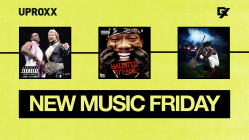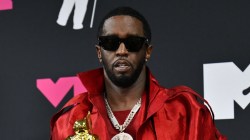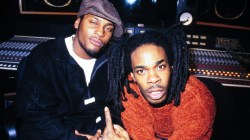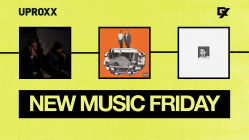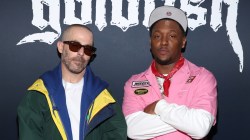Executive producer. In the music industry, it’s difficult to balance the difference between those two terms in this day and age. Just as devout sports fans memorize the coaches, the playbooks and the management styles, 2009’s Hip Hop consumer is likely to know the names of at least a few high profile A&R names, countless executives and a manager or two. To me, the single act that opened up that space were those big bold letters underneath the tracklisting on the back cover of CD – the executive producer.
Although names like Tom Silverman, Tyrone “Fly Ty” Williams and Juggy Gayles may have meant something to the avid liner note reader in the ‘80s, it’s presumable that two – if not three of these gentlemen (Tommy Boy, Cold Chillin’ and Sleeping Bag Records founders) had no interest in getting exposure. Many times, their names came lines below God, Allah, mothers, girlfriends, weed carriers and block-boys found in rapper “thank you’s.” They were extra, behind the scenes and silent partners and catalysts in making the sales and impact that made the stars.
Russell Simmons, the premier executive for the first 15 years (and arguably last 15) of commercial Hip Hop was a little bit different. Just look at casting Blair Underwood in Krush Groove to play himself as an essential part of the Def Jam story, Russell seemed to largely fall back, even when the super-evasive Rick Rubin opted to act. Though he almost never goes quiet, Simmons, to this day, dodges a lot of credit he’s due, and while he’ll talk till the cows come home, seems as though he could care less about being seen – minus those new Phat Farm campaigns, which actually sold me on the brand more than ever before. How many classic Def Jam – and a few Profile back inserts could have – but didn’t sport Simmons’ name (alright, maybe RUSH Management logos did appear)? Think now to how even a pizza-cutter mixtape seems to have no less than three executive producers, many of which couldn’t decipher mechanical royalties from mechanical pencils. Russell Simmons was the first executive that became a Rap household name, and before the Def Comedy stuff, Life & Def and all his grand-standing ventures, he seems to have never wanted the fame, only the fortune.
With the new generation of boutique labels in the early ‘90s, whereby majors supplied strong musical ears and urban-savvy businessmen with imprints, that all changed. The industry was too cutthroat and image was too important. Whether they were subversive or overt, everybody seemed to lust Simmons‘ fortune, and many craved fame more.
Laugh at his recent blunders if you like, Marion “Suge” Knight was the pioneer of executive producer – as we know it. He cleverly entered the scene as Dr. Dre’s hybrid quarterback and puppeteer, maintaining a low profile and a reputation that required no publicist, whether true or not. Although docile at the time of The Chronic, Suge started coming into his own by Doggystyle and Above The Rim releases in 1993 and early 1994. Stories started traveling, that big font started appearing on multi-platinum discs and Death Row became a challenge to all those labels that had carried over from the ‘80s, that would soon close down or get swallowed by the big boys.
The real power move of Suge came by 1995. As Death Row started to mirror the New York Yankees – a full roster of both homegrown and acquired superstar talent, Suge was able to get money elsewhere, doing outside management. It was no coincidence that ’95 was the same year that Club 662 opened in Las Vegas and the same year he took the Los Angeles Times to visit a car bodyshop in San Diego that housed Suge’s 63 (at the time) cars. Although attempts at managing Mary J Blige and Wu-Tang Clan (that Ronin Ro revealed in his book Have Gun Will Travel) fizzled out, Suge was able to help transform local Compton celebrity DJ Quik to coastal superstar.
1995’s Safe + Sound was executive produced by Suge Knight, and it was a pivotal Hip Hop album in Quik’s career, but also allowed the Compton producer/rapper to get comfortable with his Tree Top Piru allegiances, something largely stifled on his first two albums at a time when gangsta rap ruled the charts and pop culture. Moreover, it was through Knight’s reputation for war-mongering that Quik was able to take his scathing MC Eiht diss, “Dollarz N Sense” and manufacture the record as a street single by way of its being licensed to Murder Was The Case’s multi-platinum soundtrack. After the age of instant-pressed twelve inch battle releases faded, as witnessed in the Boogie Down Productions/Juice Crew battles, Quik serviced an album-cut to the masses, without a video, that laid the ground for records like “Takeover,” “Ether” or “Piggybank” – infamous diss records that became just as big as traditional singles. This was embraced by radio, and known by novice Rap fans, something I firmly believe that Suge had as much to do with as Quik.
Suge also used his executive status to scare a label into shaping up. Profile Records was undoubtedly fearful of losing their west coast flagship star to Death Row. This tactic was later employed by Dr. Dre, who was reportedly courting Xzibit to Aftermath around the time of 2000’s Restless, a Sony release that Dr. Dre executive produced. The same could be said of Freeway‘s interesting 2007 relationship with G-Unit. Many argued that keeping 50 Cent talking about Freeway could have intimidated the Def Jam brass (read: Jay-Z) into green-lighting the patient emcee’s sophomore project. Although none of these attempts ultimately worked to the degree intended, these business moves beneficial to the executives, and in all three cases resulted in quality music. Regardless if the saying that you never love your spouse as much as when somebody else covets them is true, Rap executives certainly subscribe to it.
Just as labels No Limit, Roc-A-Fella, Cash Money and nearly everything since emulated Death Row with its chains, cars, string of free agent signings, 40-man rosters with lots of shelved artists, and household name-a-thon, so did they with executive production. Although more business-proven, and certainly playing in a different arena, would Diddy, Dame Dash or Dru Ha, Peanut Butter Wolf be as good at their jobs if not for Knight, especially in an era where executives help sell sponsorships and partnerships, critical to fill in for retail losses? The executive is the face of the company, and the one that calls the shots and often sets the tone for which artists feel comfortable there.
In early 2007, Slim Thug told me in an interview for Down magazine that Pharrell traded executive producer status on Already Platinum for a reduced rate on at least three beats, the very same reason you didn’t see Skateboard P or Star Trak Records’ logo anywhere near Boss Of All Bosses. This executive/label merger was actually none at all, and something that smoke-screened the masses into believing that one of the premier producers of the ’00s had a deeper interest in this Houston underground alto emcee.
More of the same. Lupe Fiasco had better luck without Jay-Z on The Cool than he did with Food & Liquor. The association may have garnered some press, but even “Hova” couldn’t “George Bush the button” to get that debut released three months earlier, when “Carerra Lu’s” debut buzz was white hot. Jay-Z‘s powerful sales force seemingly laughed at Lupe upon introduction, then came running back two years later, money in hand, when radio embraced “Superstar” (a testament to Fiasco and Atlantic Records).
We see this time and time again. 50 Cent’s assistance on Freeway and Lil Scrappy’s albums did little to raise their awareness on the streets or charts. Snoop Dogg has yet to rescue Tru-Life out of shelf-life at Def Jam, let alone likely jail time forthcoming. Busta Rhymes excited his hardcore Rap roots when he reportedly brought Raekwon to Aftermath, but just like Joell Ortiz, that trade couldn’t seem to clear waivers (read: Interscope‘s approval), and the “Chef” went to EMI, without Trevor Smith‘s name anywhere on his paperwork.
The executive producer has also become an excuse in Hip Hop. The Wu-Tang Clan suffered greatly when RZA ascended from producer to brand executive. The albums that the veteran producer, deejay and emcee had a heavy hand in remain the jewels of the catalogue. The last decade however, has been marred with the now Hollywood-rapper’s distancing himself from the music, most of the time. It created problems in the group as well, as Ghostface and Method Man perhaps got the attention that U-God and Masta Killa weren’t, despite the fact that all nine members had been patient with their abbot. Executive production is hardly a fair evolution from the man who innovated so many techniques in the ’90s, making himself candidate for best producer in Rap history.
If anything, executive production often does more for the artist co-signing than recipient, even in the public eye. One of my favorite things Kanye West did in recent years, was the D12 “forget me not” move of reaching back for 88-Keys. The onetime Rawkus Records producer had never had a career as an artist, or been a household name. However, through a creative genesis, ‘Ye and 88 brought Decon Records a true conceptual masterpiece, with Kanye West on the single, a video and enough vagina monologue to generate interest on the blogisphere. Still, the Soundscan report that week had no sign of success – or Death of Adam.
Executive producers are oft vilified – when rappers later part ways, however, they’re great tokens to remind us of who superstars once were. Jay-Z was once hoping to get his debut album out, a balance of food and liquor in its own Reasonable Doubt message. Kanye West was once that unknown producer making heaters for Beanie Sigel, Scarface and “Hov,” with true star power and creative potential. Jay-Z was instrumental in helping ‘Ye make Rap fun again, a product of listening to both street tales and backpacker Hip Hop. This was true perhaps of his interest in Lupe Fiasco as well. Even this summer, Xzibit’s executive producing of Awol One’s Owl Hours reminds us that the Pimp My Ride/Sprite household face still remembers his Los Angeles underground/Alkaholiks Hip Hop roots. Again, don’t expect a lot of Soundscan equated love there though. Snoop Dogg has brought the aforementioned Eiht, Goldien Loc and Kam together (as Warzone), three ’80s and ’90s underground stars, that to a large extent, represent Snoop’s own career, had he not had the proper team behind him in the beginning.
Look at Rap executives by nature. Suge Knight was the antihero to Diddy and Jermaine Dupri’s hero. One was downplayed in the limelight, but used his reputation as a calling card for getting results. The other used branding – i.e. appearing in a video, doing ad-libs, carrying a Hollywood persona that brought attention to all associates. All every rapper is adorned with a label and five entourage artists today, this is cause for consideration.
Just as Caesar’s hubris was the cause for his demise, was Diddy’s front-running at Bad Boy the cause for their once dream-team roster to evolve to a revolving door of popcorn acts that replace each other. No Limit crumbled because its head executive chased his childhood dream of a pro basketball career. And lastly, the truest executive producer, Knight, lost his label and his industry foothold due to a caricature of the reputation that was carefully understated at the dawn of his career.
There will always be the executive producer in Rap. Whether it was the stereo-typical, old, White, maybe Jewish man in the ‘80s, the sunglasses and cigar donning personality of the ‘90s, or just another rapper – as its been in the ‘00s, they aren’t going anywhere. But it’s about damn time that labels, accountants publicists and fans understand that its merely a credit to help the rich get richer, further their overall agenda and it almost never equals more sales.


